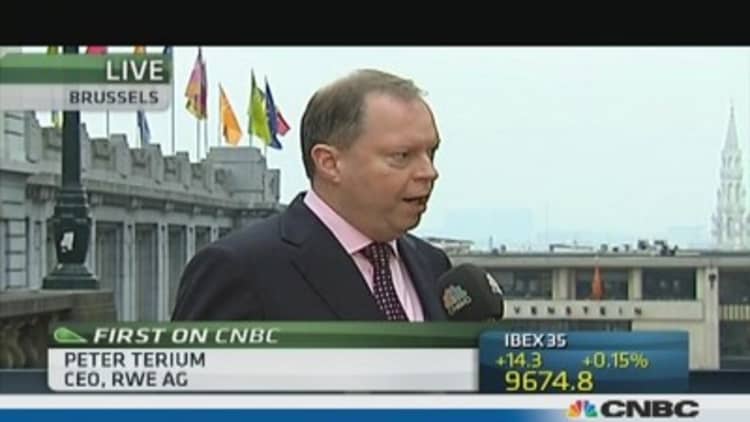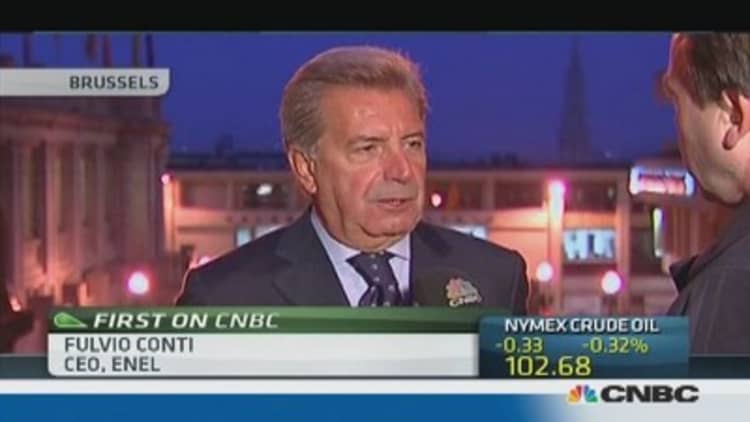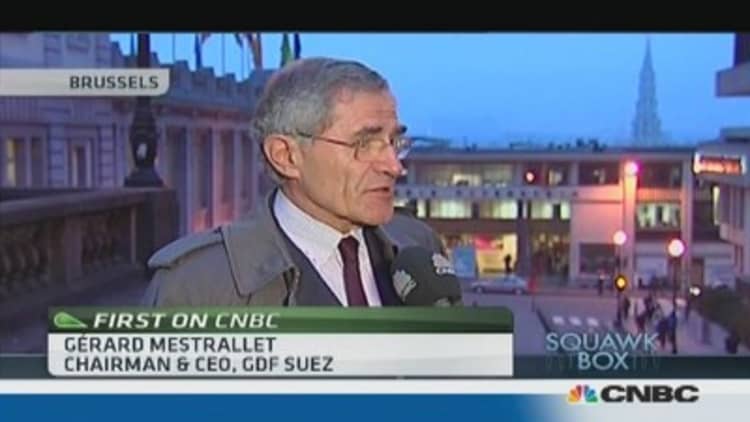
The European Union needs to change its policies toward energy subsidies, regulations and emissions targets, the chief executives of Europe's leading energy companies told CNBC on Friday, warning that increasing operational difficulties could lead to "blackouts" across Europe.

Energy companies say they were pushed to invest heavily in renewable energy and technology by the 28-country European Union but have since run into rules that differ from country to country, an inadequate Europe-wide emissions-trading system and problems with subsidies.
Peter Terium, chief executive German electric utilities firm RWE AG told CNBC that he and other executives meeting in Brussels were there to urge European Union policymakers to dangers facing the energy industry.
"We want to send an a SOS to Europe, not for the companies, not for the sector, but for Europe as a whole. A prosperous society cannot be prosperous without proper energy infrastructure and our infrastructure is in jeopardy", Terium told CNBC in Brussels.
Warning that Europe could face power blackouts if the economy in Europe recovered but energy provision remained inadequate, Terium warned that energy companies were closing power plants across the continent "that are technically and environmentally very efficient, but we're shutting them down because the system does not allow us to economically operate those plants."
Fulvio Conti, chief executive and general manager of Italian electricity firm ENEL told CNBC that EU regulations needed to be "straightened out" to make the industry "investable again."
"We have contrasting regulations coming from Europe and from member states that are colliding and most of the markets are seeing an increase in prices for the consumer and no profits whatsoever for the industry, that makes no sense at all," Conti told CNBC in Brussels, where the chief executives of Europe's leading energy companies have gathered to discuss European Union energy policy with policymakers.
In a move that highlights the varying energy policies across Europe. the French constitutional court Friday upheld its ban on fracking in France, the Associated Press reported.
The direction of EU policy and whether renewable energy initiatives should be state-funded has proved divisive among industry and governments.
The European Commission, the EU executive arm, released a draft copy of its guidelines for state aid for energy production this week. In it, it dropped a reference to subsidies for nuclear power, which could affect whether governments can use public funding to help finance further plants.
(Read more: EM currency crash 'could hit oil demand': IEA)
While countries such as Germany are phasing out nuclear energy in favor of renewable energy resources such as wind and solar, the U.K. wants to expand its nuclear power resources with the help of public funds.
ENEL's Conti said that on the contrary to wanting more subsidies for the energy industry, subsidies had created a "very peculiar" situation in Europe where countries were abandoning nuclear power plans for "non-mature technologies and renewables."
"We want to eliminate subsidies," he said on Friday. "Too many subsidies are being given on intermittent renewables, too many to local coal and all of these are [leading to] a disaster. The decision to promote non-mature technologies and renewables through subsidies is creating this very peculiar situation where citizens are paying a higher price, the industry is recording no profits and no investments are being made."
(Read more: A US-style fracking revolution for the UK?)
The end result, Conti noted, was that the environment was not seeing any benefit to subsidies meant to encourage the development of greener energy anyway – a moot point for the EU which has carbon emission targets for energy companies in the EU as it aims to get 20 percent of its energy from renewable resources by 2020.
The shale gas revolution in the U.S. has further upset European energy companies' competitiveness and their profits, however.
While energy prices have fallen in the U.S. due to the abundance of the cheap natural gas, in Europe, energy – especially natural gas prices from Russia -- have risen.
(Read more: US shale revolution leaving Europe in the cold)

Europe has subsequently turned to importing cheaper U.S. coal in a bid to offset higher energy prices that have caused controversy among consumers. Gérard Mestrallet, the chairman and chief executive officer of French utility GDF Suez, said the EU was now in a "paradoxical situation" as it turned to coal against a backdrop of greenhouse gas emissions targets.
"The cheap gas in the U.S. is used to produce electricity and U.S. gas is eliminating coal. So the cheap coal from the U.S. is arriving in Europe and it's eliminating natural gas in Europe. As you know, gas is much cleaner than coal. To produce the same quantity of electricity, natural gas is creating half less CO2 than coal, so therefore we have this paradoxical situation."
That energy companies are being hit by higher operating costs and seeing their profits squeezed will find little sympathy among European consumers who have seen their energy bills rise.
In the U.K.,where energy prices have risen 24 percent over the last four years, according to regulator Ofgem, a row has broken out after energy supplier SSE hiked prices by more than three time the rate of inflation, implementing an 8.2 percent price rise in November.
Scotland-based firm SSE is the first of the six large energy providers to hike prices ahead of winter but is not expected to be the only one to do so.
- By CNBC's Holly Ellyatt, follow her on Twitter @HollyEllyatt
Follow us on Twitter: @CNBCWorld


